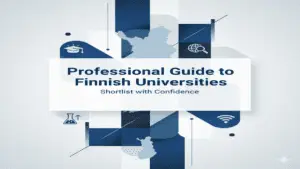Aspiring to study abroad at a top university is a common goal, but the application process can feel overwhelming, especially when you’re concerned about profile gaps and backlogs.
Do these imperfections automatically disqualify you? The good news is, not necessarily. Universities are increasingly adopting a holistic approach, valuing well-rounded individuals who demonstrate resilience and potential, even with a less-than-perfect academic record.
This blog post will provide practical strategies to address your profile gaps and backlogs head-on. We’ll explore how to present a compelling application that highlights your strengths, demonstrates your growth, and ultimately, increases your chances of gaining admission to your dream university. Let’s delve into how to navigate university admission with backlogs and turn potential weaknesses into strengths. This guide aims to answer the question: How to get into top universities with profile gaps or backlogs?

Can I Apply with Academic Backlogs?
The short answer is yes! Many universities, particularly in countries like the United Kingdom, Australia, and Canada, acknowledge that students may encounter academic challenges during their educational journey. Having a few backlogs does not automatically eliminate you from consideration. However, transparency and how you address these backlogs are crucial.
Universities focus on your overall academic performance, potential for success, and ability to learn from challenges. Don’t dwell on negative aspects of backlogs. Instead, showcase your strengths and positive steps to improve. Emphasize your commitment to overcoming past obstacles. Show the admissions committee you are resilient and determined. Prove you are ready to thrive in their academic environment.
How to Explain Low Grades in Applications?
Explaining low grades requires a thoughtful and strategic approach. Honesty is paramount when addressing these concerns. The best way to explain low grades in applications is to contextualize them. If extenuating circumstances, such as illness, family issues, or other significant life events, negatively impacted your academic performance, clearly and concisely explain these circumstances in your application essay or through an additional statement.
However, avoid making excuses or shifting blame. Instead, focus on what you learned from the experience and how you have improved since then. Did you actively seek tutoring or academic support? Did you reassess your study habits and implement more effective strategies? Highlight the positive steps you took to address the issue and demonstrate tangible growth. Furthermore, showcase your strengths in other academic areas, like strong performance in related subjects or impressive extracurricular participation. Frame low grades as a learning experience and show your commitment to improvement. This helps mitigate their negative impact and presents a more holistic view of your academic potential.
Do Universities Accept Students with Gaps?
Yes, universities routinely accept students who have gaps in their academic or professional history. These gaps are increasingly common, particularly in today’s dynamic and ever-changing environment. Students may take time off for various reasons, including travel, work, family care, or the pursuit of personal interests. The important thing is to frame these gaps in a positive light and demonstrate what valuable experiences and skills you gained during that time.
Instead of viewing a gap year as a period of inactivity, showcase it as an opportunity for personal and professional development. Did you develop valuable skills such as leadership, teamwork, or problem-solving? Did you gain valuable insights into your career goals or discover new passions? Explain how the gap year or work experience helped you grow as a person. Explain how it has better prepared you for success in your chosen field of study. By highlighting the positive aspects of your profile gaps, you can demonstrate that you are a well-rounded and adaptable individual with a diverse range of experiences.
What Documents Help Justify Academic Backlogs?
Several documents can significantly strengthen your application and provide valuable context for explaining academic backlogs. These documents work together to paint a comprehensive picture of your academic journey and demonstrate your commitment to overcoming challenges.
Firstly, a strong and well-written statement of purpose or personal essay is absolutely crucial. This provides you with the opportunity to directly address your backlogs and explain the circumstances surrounding them in your own voice. It allows you to showcase your resilience, self-awareness, and ability to learn from your mistakes. Be honest and transparent, but also focus on the positive steps you’ve taken to improve and demonstrate your potential for future success.
Secondly, obtaining letters of recommendation from professors or employers who can attest to your character, work ethic, and potential can be extremely beneficial. These letters provide external validation of your abilities and can help counteract any negative perceptions associated with your academic backlogs. Choose recommenders who know you well and can speak specifically to your strengths, your ability to overcome challenges, and your potential for success in graduate school.
Finally, if you have any official documentation to support your explanation, such as medical records or letters from family members, you may consider including them. However, always prioritize concise and relevant information over excessive documentation. Be mindful of privacy concerns and only include information that is directly relevant to explaining your backlogs.
How to Strengthen Applications Despite Profile Gaps?
Strengthening your application despite profile gaps and backlogs requires a comprehensive and strategic approach. Focus on showcasing your strengths, highlighting your potential, and demonstrating your commitment to success.
Firstly, focus on excelling in other areas of your application, such as standardized test scores (GRE, GMAT, IELTS, TOEFL). A strong test score can serve as a powerful indicator of your academic abilities and can help to compensate for weaker areas in your profile. Invest time and effort into preparing for these exams and aim to achieve a score that reflects your true potential.
Secondly, actively seek out relevant extracurricular activities, internships, or volunteer experiences that showcase your skills and interests. These experiences demonstrate your commitment to personal and professional growth and highlight your ability to contribute to the university community. Choose activities that align with your academic and career goals and that allow you to develop valuable skills such as leadership, teamwork, and communication.
Tailor your application to each university, emphasizing profile aspects that align with their values and priorities. Research each university thoroughly to understand their ideal candidates. Highlight experiences and skills that make you a good fit for their program. Demonstrate genuine interest in attending their institution. Tailoring your application shows you understand their program and are a committed applicant.
Navigating the complex world of university admission with backlogs requires careful planning and execution. Don’t let profile gaps and backlogs deter you from pursuing your study abroad dream!
For personalized advice on how to address your specific concerns, craft a compelling application, and navigate the complexities of the admission process, contact IMFS, the pioneers in study abroad counseling services. We can help you identify universities that are a good fit for your academic profile and career goals.





